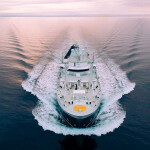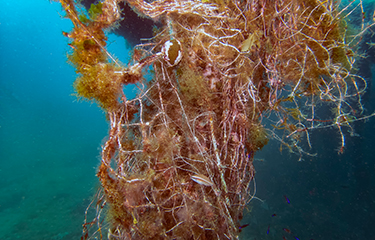An environmental advocacy group is calling governments to include abandoned or discarded fishing gear under a Global Plastics Treaty being considered by the United Nations.
The Ocean Conservancy claims that abandoned, lost, or discarded fishing gear – collectively known as ghost gear – is a major source of plastic pollution, yet it has not been included in discussions about the treaty.
“The vast majority of fishing gear is made of plastics, meaning once in the ocean, rivers, or lakes, it never fully goes away,” Joel Baziuk, associate director of the nonprofit’s Global Ghost Gear Initiative, said in a statement. “And because fishing gear is designed to trap and kill marine life, it can continue to do so indefinitely. Ghost gear is not only devastating for our ocean, but for the fishers and communities that depend on it for their livelihoods.”
Fishing gear is “the single deadliest form of marine debris,” according to research produced by the Ocean Conservancy in 2015. Currently, there are no international agreements on the management of ghost gear, and only a few national governments have adopted regulations to address the issue, the group said.
In a recent high-profile case, a North Atlantic right whale entangled in 157 feet of line and two wire mesh traps from Nova Scotia was spotted off the coast of North Carolina, U.S.A. While scientists were able to disentangle the whale, the incident highlighted concerns over the dangers of ghost gear and ignited a fierce debate in the Maine lobstering community over U.S. regulations intended to protect whales from fishing equipment. While Monterey Bay Aquarium’s Seafood Watch program has listed North American lobster as a species to avoid over right whale safety concerns, Maine public officials and lobster industry representatives have argued those concerns are vastly overstated, since the last right whale entanglement that was directly attributed to Maine lobster gear dates back to 2004.
“I understand objecting NGOs are concerned with rope entanglements, as are we, but I don't understand why they are set on using Maine lobster as the punching bag rather than fisheries that actually entangle whales, and ships that strike and kill them,” Luke’s Lobster Co-Founder and Chief Innovation Officer Ben Conniff told SeafoodSource previously. “Based on what they prioritize in their quotes, they could be spending time and resources going to the ropeless consortium and working with the science center and ropeless manufacturers, as many in the lobster industry are doing. That would be an actually productive way to promote an eventual solution for fisheries that do overlap with whales.”
Northeast lobstermen are also outfitting and testing new gear to reduce risk to right whales. The Atlantic States Marine Fisheries Commission is reimbursing some Maine regional lobstermen for gear modifications required by North Atlantic right whale protections introduced in 2021. And in Rhode Island and Massachusetts, the Northeast Fisheries Science Center Gear Research Team is testing ropeless fishing gear with 30 commercial lobster vessels.
The Ocean Conservancy launched the Global Ghost Gear Initiative – a coalition of 150 stakeholder representing governments, agencies, academia, and intergovernmental organizations – in 2015 to address the growing threat discarded fishing gear poses to ocean wildlife. The National Oceanic and Atmospheric Administration partnered with the initiative in 2016, and the full U.S. government joined in 2020, becoming the 16th country in the consortium. The initiative has worked to remove abandoned fishing gear from the ocean and produced a framework with best practices to reduce the creation of more gear debris. That framework has been adopted by a number of seafood companies and government regulators, according to the Ocean Conservancy.
In March, the U.N. adopted the End Plastic Pollution resolution, which established a framework for drafting a legally-binding agreement by the end of 2024. The negotiating committee held its first meeting late last year, but so far there has been little discussion of fishing gear, the Ocean Conservancy said.
As the committee prepares to enter its second round of negotiations in Paris, France this summer, the Ocean Conservancy is calling for U.N. member states to recommend strong ghost gear provisions.
“We simply cannot address the plastic pollution crisis in our ocean without addressing the prevalence and impact of ghost gear,” Ocean Conservancy Vice President of Conservation, Ocean Plastics Nicholas Mallos said. “We call on every country involved in the treaty negotiation to adopt strong ghost gear provisions at this stage.”
The Ocean Conservancy will hold a virtual briefing 25 April, 2023 to discuss the importance of including ghost gear in the treaty.
Photo courtesy of Rob Atherton/Shutterstock







